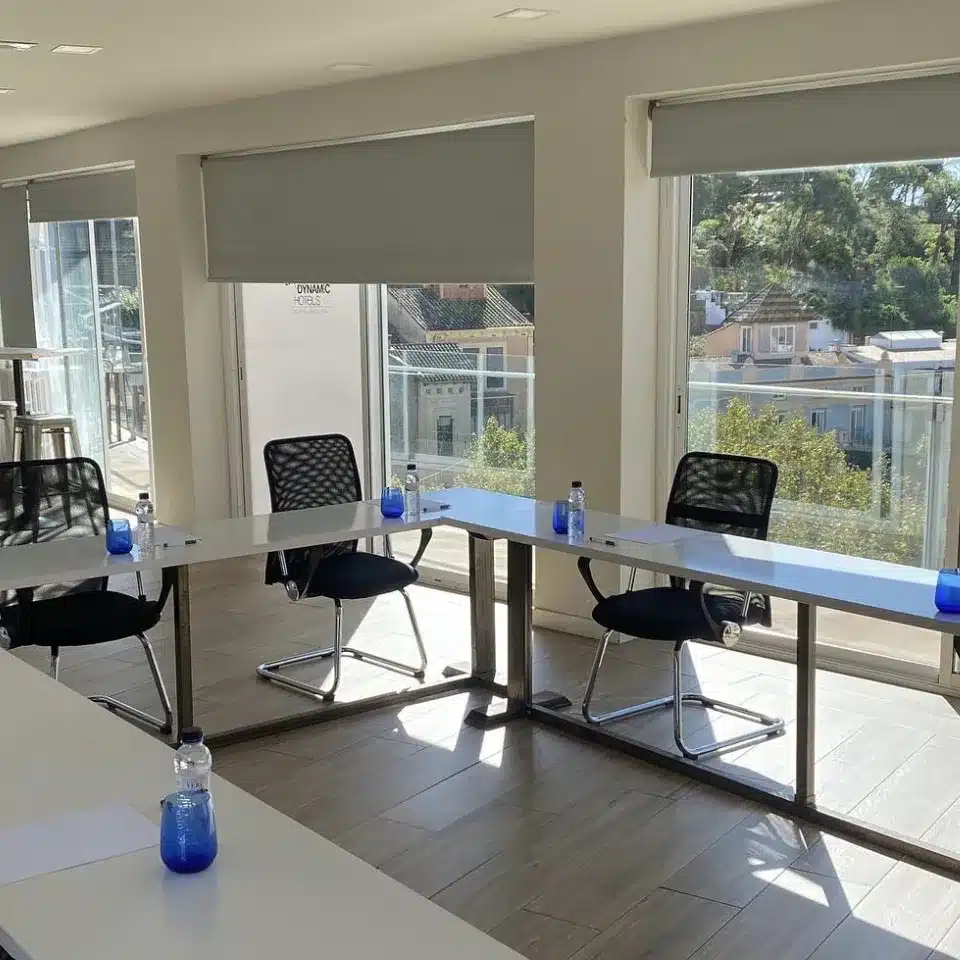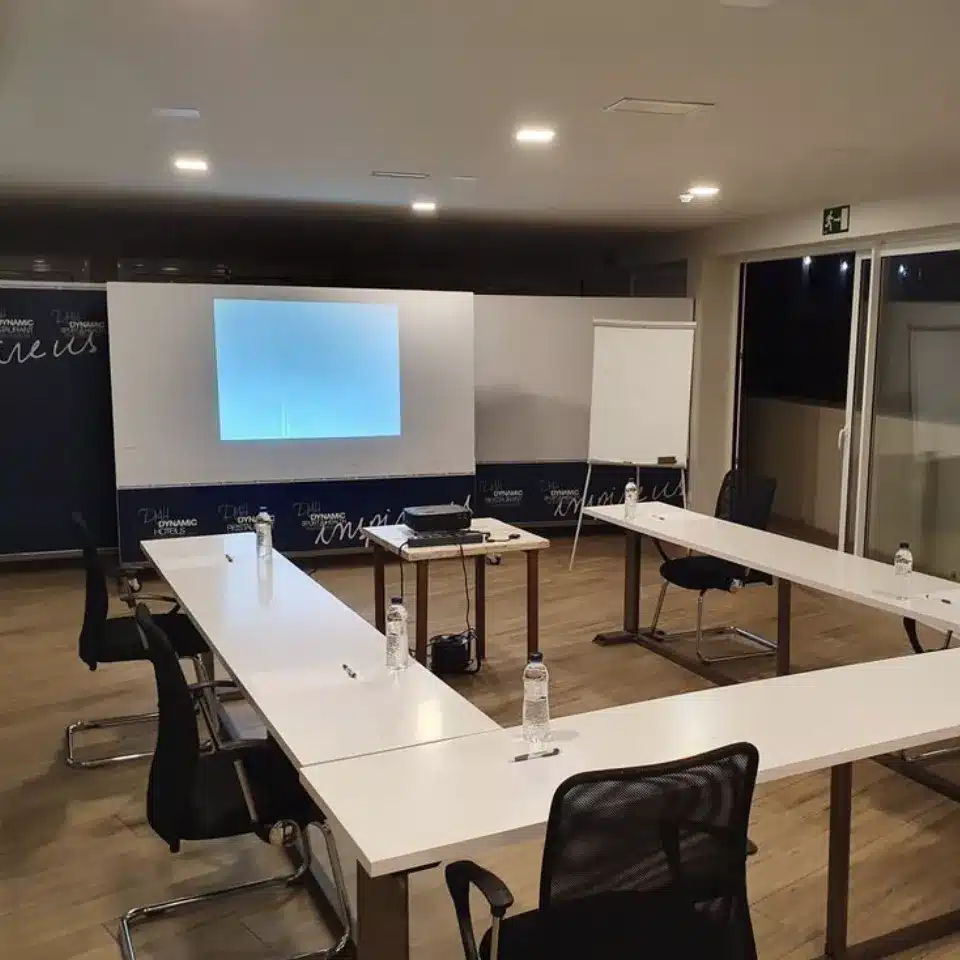Ferran Barbarà
I’m Ferran Barbarà, passionate about tourism and gastronomy in the Maresme, and a specialist in marketing and web design—always ready to share my love for this vibrant Catalan region.
When opportunities are on the table, a well-organized business meeting can be the starting point for something big
Updated: 2025
Not all meetings are the same. Company meetings help teams stay aligned. Business meetings, on the other hand, are the ones that open doors: they serve to close deals, connect with new clients, or strengthen key relationships.
At Dynamic Hotels we’ve been organizing both—day-to-day and decisive meetings—for years, and one thing is clear: proper preparation makes all the difference. Because yes, a meeting can be just a chat… or the beginning of something great.
That’s why we wanted to share in this article some practical tips to help you prepare your next business meeting with more confidence, clarity, and effectiveness. Whether at your company or in one of our spaces, here are some key ideas we believe will help you make a real impact.
Before discussing the best way to plan a successful business meeting, always remember: it’s not about meeting for the sake of meeting. A business meeting only makes sense when there’s a clear objective justifying sitting down with the other party: closing a deal, exploring a collaboration, presenting a service, or simply strengthening a professional relationship.
These meetings are an opportunity to bring key people face-to-face before making important decisions. They help build trust, align expectations, and move forward on issues rarely resolved by email alone. In an increasingly digital environment, a well-structured in-person meeting—or even a video call—can make all the difference: it allows you to read nonverbal cues, answer questions instantly, and convey a stronger commitment.
So, before you schedule a business meeting, ask yourself: what do I want to achieve? If the answer is clear, you’ve already taken the first step toward a productive meeting for both sides.
Step 1.
As mentioned, every business meeting should begin with a clear question: what are we meeting for? Having a defined purpose from the start is key to keeping the conversation focused and preventing wasted time.
Objectives should be concrete and realistic. The more specific, the better: if they are measurable, achievable, relevant, and time-bound (the SMART criteria), it will be much easier to evaluate whether the meeting was successful. In fact, it’s advisable to share these objectives with all participants beforehand so everyone arrives prepared and aligned.
Once objectives are defined, the next step is to prepare a clear agenda. This roadmap will outline the topics to be covered and help keep the meeting within the scheduled time and focused on the essentials.

Step 2.
Not every space is suitable for every business meeting. Some require privacy and formality; others benefit from a more relaxed atmosphere that invites conversation. The number of attendees and their comfort (will you need a group-friendly hotel to accommodate participants?), the meeting type, and your company’s style all influence the ideal setting.
Choosing the right venue is part of your strategy, not just logistics. The space should align with the meeting’s objective and the image you want to project. Is it a meeting with potential clients? A session with international partners? A key presentation? Each scenario demands something different.
At Dynamic Hotels we always say that renting a meeting room is like having a tailored suit made. A well-chosen space creates the perfect atmosphere. Without it, even the best agenda can fall flat.

Step 3.
Selecting the best timing is crucial for a successful business meeting. Weekdays—especially Tuesday through Thursday—are often most effective, as most professionals are fully engaged and available. If you want a more relaxed vibe, Thursdays or Fridays can work well, particularly for deal-closing sessions or networking.
It’s also important to consider the time of day. Will it be in the morning, after lunch, or late afternoon? Whatever slot you choose, aim to accommodate attendees’ schedules and ensure everyone arrives without stress or delays. Flexibility is key, especially if travel is involved or the meeting takes place offsite.
Remember, knowing when to meet is as important as knowing where and with whom. It’s an integral part of any well-thought-out plan for a successful business meeting.

Step 4.
A well-organized business meeting needs someone to lead it. But it’s not enough to just be a good speaker: they must keep the meeting on track, redirect off-topic discussions, and most importantly, ensure time is used effectively.
The ideal leader knows the subject matter, communicates clearly, and stays focused on the objectives. Additionally, having the authority or legitimacy within the group helps maintain momentum and encourages participation.
We recommend designating one person responsible for the overall meeting and delegating blocks or topics to other team members. This prevents overload and fosters a more agile, participative, and productive meeting.

Step 5.
The number of attendees directly influences how a business meeting unfolds. Too many people can lead to loss of focus, extended discussions, and unclear decisions. Too few may lack diverse perspectives or decision-making power.
The ideal balance provides enough expertise to add value without overcrowding the room. An effective meeting is one where each person has a defined role, understands why they’re there, and can contribute to the meeting’s objectives.
In internal or in-house meetings it’s easier to adjust numbers. But for external sessions—clients or partners—plan ahead who truly needs to attend to keep the meeting agile, useful, and results-oriented.

About the Author of This Post
